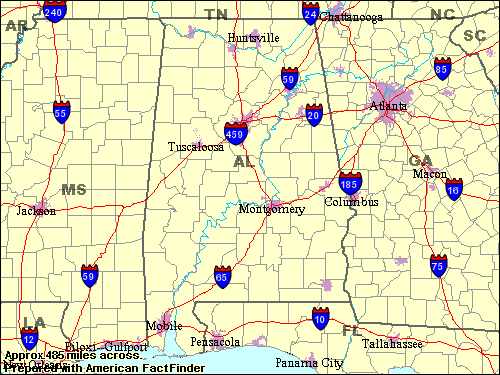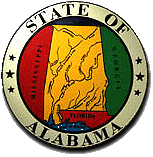|
Travel
& Geography
Travel to the United States | The States & Territories | The Regions of the United States | Facts & Statistics |
|
|
||
 |
||
|
Alabama, "The Heart of Dixie"
Abbreviation: AL |
||
|
The etymology of
the word or name, Alabama, has evoked much discussion. It was the name
of an Indian tribe (Alabama, Albama, Alebamon, Alibama, Alibamou, Alibamon,
Alabamu, and Allibamou). Alabama possibly means "Here We Rest", but
it could also mean "thicket clearers", Alabama being a compound
of Alba meaning "a thick or mass vegetation," and amo
meaning "to clear, to collect, to gather up." Alabama
became the 22nd state in 1819. From the early 19th century, Alabama's
economy was dominated by cotton. However, although it is still an important
crop, such as corn, peanuts, soybeans have taken over much of the former
cotton lands. Particularly in the second half of the 20th century, a
comparatively rapid industrialization set in. The Tennessee Valley Authority
(TVA) program of hydroelectric power production, begun in the 1930s,
fostered the growth of giant fertilizer, munitions, and aluminum industries.
Alabama, known as "Heart
of Dixie" occupies a central place in the history of the South. Montgomery,
the Alabama capital, served as the first Confederate Capital during
the Civil War. Tourists can visit Alabama's historic homes and gardens,
reminiscent of the Old South. Also popular are the resorts and beaches
on Dauphin Island, the Gulf Shore and Mobile Bay.
GOVERNMENT: ECONOMY: |
||
|
DISCLAIMER Any reference obtained from this server to a specific commercial product, process, or service does not constitute or imply an endorsement by the United States Government of the product, process, or service, or its producer or provider. The views and opinions expressed in any referenced document do not necessarily state or reflect those of the United States Government. |
|
U.S. Diplomatic Mission to Germany /Public Affairs/
Information Resource Centers Updated: January 2004 |

